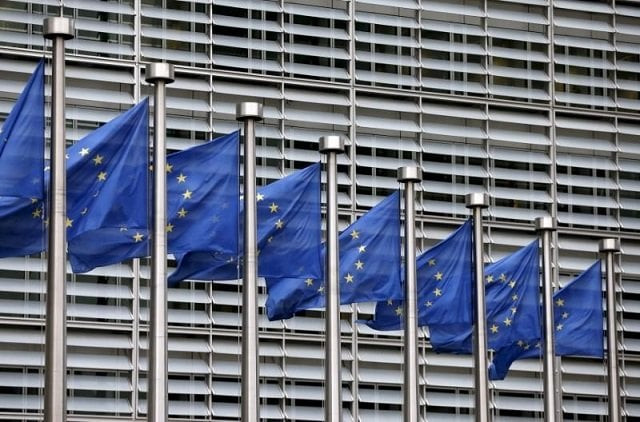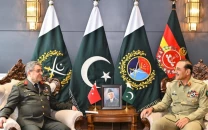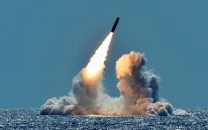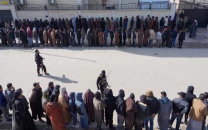EU leaders back UK in blaming Russia for spy attack
European Council agrees with UK government that highly likely Russia for Salisbury attack

PHOTO: REUTERS/FILE
At a EU summit in Brussels, the European Council "agrees with UK government that highly likely Russia is responsible for #SalisburyAttack and that there is no other plausible explanation", council president Donald Tusk tweeted.
The strong statement of support came after May briefed the other 27 EU leaders over dinner about the investigation into the March 4 poisoning of Sergei Skripal, a former Russian double agent, and his daughter Yulia in the city of Salisbury, in southern England.
Attention will now turn to possible action by EU states with some, including France and Lithuania, indicating willingness to follow Britain in expelling Russian diplomats.
May had earlier warned that Russia poses a threat to the whole bloc following the attack, which London says involved the use of a Soviet-designed nerve agent known as Novichok.
"It is clear that the Russian threat doesn't respect borders and indeed the incident in Salisbury was part of a pattern of Russian aggression against Europe and its near neighbours," she said as she arrived at the summit.
May told her counterparts that the threat will continue "for years to come" — long after Britain leaves the EU in 2019.
British PM seeks EU backing on spy attack
The Skripals both remain in remain in hospital under heavy sedation after they were found collapsed on a park bench, although a British policeman who was also contaminated was released from hospital on Thursday.
The United States, France and Germany offered early backing for the conclusion that Moscow was to blame for the first offensive use of a nerve agent in Europe since World War II.
But Britain's efforts to win a tough, united line from all 28 members ran up against countries keen to protect their Kremlin ties, notably Greece and Italy.
At a meeting with May earlier on Thursday, French President Emmanuel Macron and German Chancellor Angela Merkel both called for a "strong European message", their offices said.
The poisoning has triggered a furious diplomatic row between London and Moscow, with tit-for-tat expulsions of diplomats on both sides.
The Kremlin denies any responsibility and Russian state media have offered numerous alternative explanations.
Russian President Vladimir Putin convened a meeting of his national security council on Thursday to discuss "Britain's hostile and provocative policy towards Russia", according to a Kremlin statement.
British officials have been pressing European allies to follow London's lead, after it expelled 23 diplomats it said were spies.
EU cautiously welcomes Trump tariff exemption
Lithuania's outspoken President Dalia Grybauskaite said she was giving serious thought to the matter.
"All of us we are considering such measures," Grybauskaite said.
A French presidency source said Paris was also ready to act.
"Some countries, like France, are ready for possible measures to be decided at a national level in cooperation with other European countries," the source said.
Thursday's statement represents a significant shift from that issued by EU foreign ministers earlier this week, which said only that they took Britain's allegations against Moscow "extremely seriously".
A dissenting rump including Greece, Italy, Cyprus and Austria, keen to preserve their good relations with Moscow, had pushed for the watered-down version of a summit statement.
Greek Prime Minister Alexis Tsipras urged caution, while other leaders including Bulgarian Prime Minister Boyko Borisov and Luxembourg Prime Minister Xavier Bettel said they needed to see more evidence.
But the poisoning has heightened worries across Europe about Russian meddling — from repeated cyber attacks to what the EU has called an "orchestrated strategy" of disinformation aimed at destabilising the bloc.
May emphasised this point, stressing that despite Brexit, "the UK will stand shoulder to shoulder with the EU and with NATO to face these threats together".
Authorities have yet to disclose exactly how Skripal and his daughter were poisoned, although dozens of people in the area were assessed by medics for possible contamination.
Local policeman Nick Bailey was hospitalised following the incident but was released on Thursday.
"Normal life for me will probably never be the same," he told reporters.
Britain believes it knows the exact type of chemical used and where it came from, but has called in experts from the Organisation for the Prohibition of Chemical Weapons to test its samples, as required by international law.
Their tests, which a British judge ordered Thursday, could include samples of blood from Skripal and his daughter. They are expected to take at least a fortnight.



















COMMENTS
Comments are moderated and generally will be posted if they are on-topic and not abusive.
For more information, please see our Comments FAQ